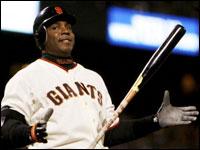Transcript
BOB GARFIELD:
This is On the Media. I'm Bob Garfield. Within the next month or so, barring injury or, say, indictment, San Francisco Giant slugger Barry Bonds will break the all-time career record for home runs. As of Friday afternoon, Bonds stood at 745, only 10 swats away from tying Henry Aaron. But Barry is no Hank. For one, he is famously unlovable. Secondly, he is widely suspected of cheating with performance-enhancing drugs.
San Francisco Chronicle columnist Ray Ratto has been following the Bond saga, and he joins me now. Ray, welcome.
RAY RATTO:
Hello, Bob. How are you?
BOB GARFIELD:
Splendid, thank you. Now, I don't think this is my imagination, but the run-up to the record-breaking home run has been quite muted compared to a few years back when Mark McGwire and Sammy Sosa were making their very dramatic assault on the single-season home run record, when it was all Sammy and Mark all the time. Not so this time around. Am I nuts?
RAY RATTO:
No, it is more muted, and there's a number of reasons for that. One, it's not the first time a home run record has been assaulted in the last 10 years. Two, there is the backdrop of the performance-enhancing drugs investigations, of which Bonds is a proud member on center stage. Three, it's the fact that Bonds is not a popular figure in American culture the way Sammy Sosa contrived himself to be in '98 and the way Mark McGwire sort of rode along with that.
Plus, you know, he's still 10 away right now. I mean, that's a month's time. And once he hits 752 and 753, you may see the coverage change some.
BOB GARFIELD:
Yeah, we're still 10 home runs away, but had this been, let's just say, Ken Griffey Jr., do you think this ambivalence would reign?
RAY RATTO:
Oh, I don't think so. If it was Ken Griffey, yeah, the dynamic would be different. If it was Tony Gwynn the dynamic would be far different still. Bonds brings his own history of being militantly non-charming. [BOB LAUGHS] His M.O. is that of the surly, unpleasant but indisputably great player.
BOB GARFIELD:
Assuming he breaks the record, what will happen in San Francisco, and, most particularly, at The San Francisco Chronicle?
RAY RATTO:
Well, I think it's concentric circles that lead out from the ballpark. Inside the ballpark it's Switzerland. I mean, he can do no wrong. He is their guy. He hits his homeruns in their shirt and they love him to death.
The farther away from the ballpark you get, the more ambivalent people are. And here at The Chronicle, I think – I mean, look. Like everyone else we have our share of Giant fans in the building who will be fine with it. There are libertarians who will say, well, you know, it's his choice. Others will be more troubled by it.
I tend to cover it more as a sort of study in mass human degradation and comedy than anything else, because it's just fun to see how people tie themselves in knots over this guy and over the achievement that he's approaching.
BOB GARFIELD:
A few years ago, the late Cory Lidle talked about cheaters in baseball and was pretty roundly criticized, if not actually ostracized, by other players who just didn't think he had the standing, as a kind of journeyman pitcher, to criticize the likes of Barry Bonds. In general, how have the other players reacted to this whole circus?
RAY RATTO:
If you give them the cloak of anonymity, a fair number of them are fairly disgusted by it. But every time someone has spoken up on the record and put his name to it, the baseball fraternity is basically punished in one way or another, because in their minds you keep your problems in house. And the problem with the steroid story in particular is that if it had been kept in house, nothing would ever have been done, and they know that.
Baseball is a very insular community. It's far more insular than even Washington, DC. It's just, there's -
BOB GARFIELD:
It's like the police, isn't it?
RAY RATTO:
Yeah, the blue wall, only multiplied by two or three times because they're interested in keeping the myths alive as well. And this is the anti-myth, and it's the one that basically cheapens every great achievement for two decades in baseball, and they don't want to be part of that.
BOB GARFIELD:
I know how I'd write the headline. My headline is Bonds Breaks All-Time Home Run Record – asterisk. And the rest of the story begins with an asterisk and is essentially a footnote to the headline. What do you think?
RAY RATTO:
Yeah. My only problem with asterisks is that if he's the only one who gets one, then we'd miss the story. Because I think the story is him as the sort of focal point for a problem that baseball willingly ignored for decades and even now is trying not to come to grips with.
He shouldn't be the only one. That's the thing that I would caveat the asterisks with, because if we can ever get our hands around the entirety of this story, you'd have to literally asterisk 15 years of baseball history, and I don't know of anybody who's prepared to do that yet. But we may have to if we ever get as much of this story as we would like to get.
BOB GARFIELD:
Ray, thank you very much.
RAY RATTO:
Thank you. Appreciate it.
BOB GARFIELD:
Ray Ratto is a columnist for The San Francisco Chronicle and CBSsportsline.com.

